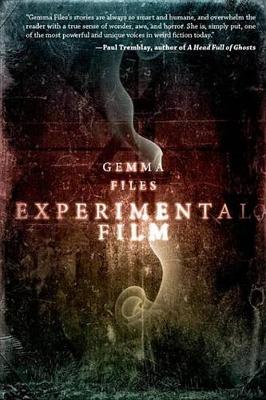Reviewed by pamela on
The story follows protagonist Lois Cairns as she tries to uncover the mystery behind a woman who may have been Canada’s first female filmmaker. Lois is an out of work film critic, ex-teacher, and mother to an autistic son. While reviewing freelance in Toronto’s underground film scene she embarks on a journey that takes her to derelict mansions, will make her delve deep into Eastern European folklore and come face to face with her own inner demons, as well as outside forces.
The concept for Experimental Film is a strong one. The medium of film has so much potential to create a stirring atmosphere. Film can convey so much within a very short space of time. If a picture can paint 1000 words, a moving picture can do even more. The disappointment is that the supernatural elements of the novel simply don’t really seem to hold any relevance to the art of film making, other than it being a convenient plot device that the author just happens to know something about. The antagonist as well seems incredibly out of place. Essentially, we have a sun worshiping demi-god who for some reason chooses to manifest in Toronto, a city that never seems to rise about 24 – 27 degrees Celsius, even in the height of summer. The setting, the premise, the antagonist; everything had potential, but the narrative simply didn’t make use of any of them. Files seemed to stick with familiar, rather than appropriate.
Lois Cairns herself was a well-developed character. She was interesting, flawed, relatable with the kinds of insecurities that we can all relate to. Unfortunately, most of her development happened within the first quarter of the novel, meaning that the plot didn’t really get going until half way through the book. Lois’ insecurities, while interesting, weren’t enough to carry the novel’s interest for so long. For a character with clear and obvious mental health issues (dealt with in a way that should have been refreshing) who was clearly on the verge of a breakdown when the book started, the characters that surrounded her really seemed to just blindly accept her supernatural experiences. No one seemed to question her in any real depth, which really stopped my suspension of disbelief as there was never any compelling evidence that anything supernatural was occurring, rather than Lois just having a breakdown.
The side characters of Experimental Film fared much worse in their development. Lois’ husband Simon existed to be the perfect supportive partner, her research assistant Safie was just a glorified sounding board, her son Clark (Lois and Clark…believe me, I groaned inwardly at that one) was autistic, which of course was used to create creepy-kid-communing-with-the-supernatural syndrome, which I found equal parts offensive and overdone within the genre, and the minor antagonist Wrob Barney was such an over-the-top caricature of narcissistic unprofessionalism that I simply couldn’t take him seriously. The minor characters were at best, archetypes, at worst, caricatures. They really took away from everything I feel Experimental Film was trying to be.
With poor pacing, far too much unnecessary exposition, a premise that didn’t deliver and a narrative that failed to scare, I must say that Experimental Film was a bit of a disappointment. All the parts were there, but nothing was followed through in a way that could satisfy. Bits and pieces read like poor imitations of other works, like Neil Gaiman’s American Gods mixed with Night Film by Marisha Pessl (another book about film that failed to deliver a satisfying conclusion). If you’d like to know a lot about the Canadian underground film scene, old film stock, and how to get a Canadian Arts grant, then this is for you. Otherwise, there are more satisfying horror novels out there.
Read this review and more at I Blame Wizards.
Reading updates
- Started reading
- 15 July, 2017: Finished reading
- 15 July, 2017: Reviewed
